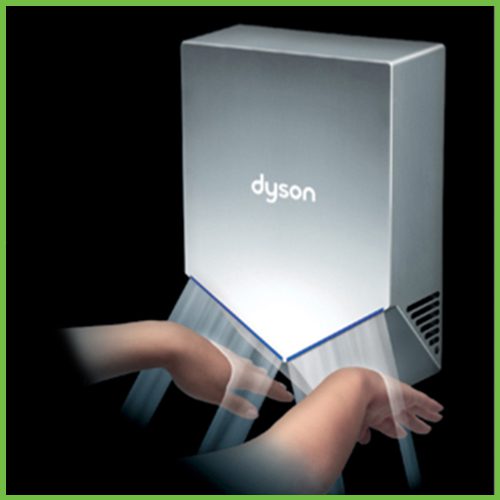Table of Contents
Last Updated on October 15, 2022
Hand dryers are a popular, efficient, and hygienic way to help users of your washroom practice good hand hygiene and prevent the spread of infection. Correct drying of the hands is an essential part of a complete hand washing routine and helps reduce the risk of spreading bacteria and viruses to surfaces when compared to wet hands.
There are a wide range of hand dryers available on the market and choosing which one is best for your washroom environment can be tricky. So, how do you choose the best one?
What is the History of the Hand Dryer?
As with so many historically important inventions, the creator of the first hand dryer does not often get credit for it.
In 1922 Messrs Hibbard, Watrous, and Bassette of the AirDry Corporation in New York applied for a patent on their new ‘electric towel’, and the hand dryer was born. This new addition to the washroom equipment market was available as a wall mounted unit, designed for “delivering a blast of heated air for drying the face, hands or hair of a person, or for drying jewellery, metal parts, glassware, or other articles.” While hand dryers proved a popular addition to washrooms, the AirDry Corporation hand dryers were cumbersome, loud, and slow. If the option of paper towels was available, they would often be the preferred choice.
Instead of the aforementioned inventors, credit often goes to one George Clemens of Illinois, who founded the World Dryer company in 1948 and enjoyed much success with his Model A hand dryer unit, offering an improved design and lower maintenance than the AirDry Corporation’s earlier model World Dryer and its hand dryers have been through many iterations, owners and modifications over the years, and continues to thrive to this day.
Despite the common association with the Dyson brand, the first ‘hands in’ dryer, where hands are placed inside the unit and water is blown away with high pressure air, was created by Mitsubishi in 1993. Despite the innovative technology, noise reduction and improved speed of drying, uptake on the Mitsubishi Jet Towel were slow, taking more than ten years to reach some markets.
One of the most disruptive companies in recent years, and one showing the most recent major innovation in the hand dryer market is that of the Xlerator® from the Excel Company, which debuted in 2001 and has been through a number of updates since. The Xlerator® dries hands in a shorter time, even if it does make a lot of noise about it.
More recently, the more common and well-known Dyson dryers began to develop and accentuate Mitsubishi’s hand drying innovation to create the Dyson AirBlade in 2007, soon reducing Mitsubishi’s share of the hand dryer market.


Why are Hand Dryers so Important?
Hand dryers are a fundamental part of any clean and sanitary washroom environment. Offering a number of benefits over paper hand towels, installing a hand dryer in your facilities helps to ensure all visitors are able to promote good practices and stay safe and healthy.
Improve Hand Hygiene
Once hands have been washed and cleaned, the final step is to dry them. Surface and superficial detritus is mostly removed during washing, however the last rub of the hands while drying can help remove further dirt and potentially harmful bacteria.
Reduce the Spread of Infections
Hand dryers help to reduce viral and bacterial transmission. Bacteria and viruses are more likely to be transmitted from wet hands than from dry hands, so proper drying practices are an essential part of the washroom experience.
A number of hand dryers are available on the market which use HEPA filters and/or antibacterial solutions, ensuring that the air produced by the dryer is sanitary too while they can also help treat the nearby surrounding area to limit any spread of germs.
Provide a Better Washroom Experience
Offering multiple hand drying solutions means providing the best washroom experience to an increased number of users. While some may prefer paper towels, paper or cloth rollers, or single use towelettes, many washroom visitors prefer the speed and hygiene offered by hand dryers.
The more recent addition of blade style hand dryers has further improved the hand drying experience for many people by reducing the time it takes to effectively wash and dry their hands. This, along with other user experience improvements such as reduced noise and better design help hand dryers provide an optimal experience for your visitors.
Keep Your Washrooms Clean & Maintained
Hand dryers produce significantly less mess than paper towels and no waste disposal is required. For commercial washrooms in public spaces such as schools and venues, the extra cleaning required from paper waste which has been mismanaged by users can soon add up.
Maintenance is vastly removed as your hand dryer does not require constant refills and are less subject to damage by vandalism and theft of contents.
Kind on the Environment
The use of hand dryers helps to reduce the carbon footprint of a business, often significantly. An often-neglected part when calculating the effects of carbon from your business activities is not only the manufacturing, packaging and shipment of paper towels to you from forest to delivery, but the removal and disposal of paper waste at the end of the life cycle.
Changing out from paper towels and older, inefficient dryers to energy efficient modern hand ones can have a significant impact on your carbon footprint.
Do Hand Dryers Save Costs?
Hand dryers are an investment purchase, with the cost of the dryer over the lifetime being compared to both the installation, refills, replacement and maintenance of a paper towel or roller unit, plus the cost of waste removal for these hand drying alternatives.
Generally speaking, costs are greatly reduced over time as modern, efficient hand dryers require much less budget in power than could be spent on daily paper towel refills or roller replacements and waste removal. In fact, some hand dryers such as the Dyson Airblade 9kJ can cost as little as $19 a year to run in comparison to paper towels which can cost near to $1500 a year to run on average and could be even more expensive depending on usage. Modern dryers are much more efficient than their ageing counterparts. If you have older units which you are thinking of replacing you may save a substantial amount of money by doing so.
Not only this, but hand dryers such as the aforementioned one can have a much lower impact on the environment using just 3.0g of co2 per dry compared to 17.1g from paper towels.
Types of Commercial Hand Dryers
A wide range of commercial hand dryers are now available, but deciding which is the best dryer for your washroom can be tricky, so here’s a guide to popular types of hand dryers to help you choose.
Hands-Under Dryers
You think of a traditional hand dryer, you are probably thinking of a hands-under dryer. The classic design has been in place for decades, with more contemporary units providing a modern drying experience from a classic style.
Some of the latest hands-under dryers automatically adjust the surrounding ambient air temperature to provide an energy efficient and comfortable experience. State of the art technology helps reduce noise and drying time and, improves the washroom hygiene experience.


Hands-In Dryers
Hands-in dryers are a more modern and fast-acting hand dryer that are some suppliers are renowned for. Their fast and fairly quiet operation makes them a popular choice for users, while operators appreciate their low maintenance and energy efficiency.
Automatic Hand Dryers
The term ‘automatic hand dryer’ describes any hand dryer which starts automatically with the use of sensors, which indicate that hands have been placed in position and it is time to start drying. Examples of this include the Dyson Airblade 9KJ hand dryer and the Dyson Airblade V hand dryer. Automatic hand dryers often have lower operating costs as they only operate when activated. In fact, the Dyson Airblade 9kJ can cost as little as $19 / year to run.
Manual Hand Dryers
Manual hand dryers are an older style of dryer which require the user to start the operation by use of a pedal when hand dryers were relatively new, and more recently by use of a button. As technology has improved and there is more awareness around the less sanitary nature of button operated hand dryers, they are a rare sight in washrooms these days.
Combined Wash & Dry Hand Dryers
Although a relatively new conception, wash and dry hand dryers are becoming more common. Wash and dry hand dryers are designed to sit above the faucet so the user can wash and dry their hands at the same time. One of the main benefits of these types of hand dryer is that the user does not have to walk across the washroom with wet hands before they dry, limiting any water that drips on to the floor. They are also well-suited to washrooms where space may be at a premium.
Is one type of hand dryer better?
Which type of hand dryer is best for your organization depends on many factors. Some elements to give thought to include:
- Space available including where the hand dryer will be fitted
- Cost
- Sound
- Style
- Speed
- Efficiency
- Environmental impact
- Sector
- Use cases – is the hand dryer going to be used by children or adults?
Brands of Commercial Bathroom Hand Dryers
Here we give a brief overview of some of the major players in the modern hand drying industry.
Dyson Hand Dryers
Dyson is an iconic name in hand drying, as well as a range of other industries. With advanced technology and innovation at the forefront of everything they create, Dyson has become a household, and industry standard name with a vast range of hand dryers that have been designed with different needs in mind.
Pebble Hand Dryers
Pebble hand dryers offer high quality, eco-friendly hand drying units known for their efficient operation and low maintenance requirements.
Choosing a Hand Dryer – What to Look Out For
With a number of different varieties of hand dryers to choose from, what factors must be taken into consideration when deciding on the best one for your business? What is deemed as the ideal solution for one business may not suit your washroom environment.
Washroom Footfall & Usage
If your washroom experiences high footfall be sure to choose a commercial unit which does not suffer from heavy usage, requires little maintenance, and is designed for constant use.
How Quiet it is
Answer questions like does the noise matter? In some cases, it will because you want a quiet hand dryer, for example in educational facilities, or areas where quiet is a prerequisite for example in religious institutions and libraries.
Style
Hand dryer designers work hard to ensure there is a hand dryer aesthetically suitable for any commercial environment. From sleek, stainless steel wall units to speckled grey units, there is a hand dryer available which will tick all the boxes for both operation and looks.
Your Business’ Budget
Budget is likely to be a priority when choosing which unit to purchase. Ensure you balance in other factors with the initial purchase cost, such as running costs and lifetime costs to make sure you get the hand dryer which makes the best long term financial sense.
The Layout of Your Washroom
How much space you have and where your hand dryer might be installed is of course an important consideration when making your choice. Measure the area carefully and make sure there are no obstacles to fitment before placing your order.
Other Use Cases for Commercial Hand Dryers
In most cases your dryers will be installed in a washroom somewhere in the building. However, there are many instances where this is not the case, and hand hygiene provision is required such as at sinks or preparation areas where hygiene is all important.
Should I look at Hand Dryers with a HEPA filter?
HEPA (High Efficiency Particulate Air) Filters are commonplace in good quality hand dryers and are designed to remove up to 99.9% of viruses, bacteria, dust and other potentially harmful particles as they process air through the dryer.
The use of a HEPA filter hand dryer helps keep your washroom sanitary and hygienic and can be especially beneficial for visitors suffering from asthma and other respiratory conditions.
Other Things to Look for When Choosing a Hand Dryer
By now you should have a fairly in-depth knowledge of hand dryers and how to choose the best dryer for your commercial washroom. If you are still undecided or are looking for more information, have a look through the following sections to learn about the various certifications which may be found on hand drying equipment.
Look at the Hand Dryer Decibel Levels
Often overlooked, the noise of the hand dryer you are buying should be considered.
Excess noise can trigger stress responses and reduce happiness and productivity. Louder hand dryers noises can over time lead to hearing loss in children too. In situations where your hand dryer can be heard by people outside of the washroom or used by children, you may to look at the decibel level of the model you are looking at. Hand dryers with decibel levels over 100 dBA can damage hearing in less than 15 minutes of exposure per day, not to mention be a distraction to your workers, visitors and customers.
What About the Carbon Trust Certification?
The Carbon Trust accreditation is given to supplier who have met or exceeded a range of criteria in the design and manufacture of energy efficient equipment.
In 2010 the Carbon Trust certified the Dyson Airblade, the first ever hand dryer to achieve this accolade. The Carbon Trust took into consideration the total footprint of the Dyson units, from materials and build right through to transportation, lifespan, and end of life disposal.
Are There Any Other Accreditations to be Aware of?
There are other certifications which may apply to hand dryers, including:
LEED – LEED certification provides independent verification that a building, home or community was designed using solutions that can help to achieve high performance in around environmental and human health such as water savings and energy efficiency. Using eco-friendly hand dryers can help your business gain LEED credits.
International Well Building Institute – The WELL certification is designed to show users that the space you are entering prioritises health and wellbeing,
Promote Hand Hygiene Best Practices in Your Business
Now you have all the information you need to choose the best hand dryers for your business.
Hand drying should be used in conjunction with hand sanitizing/hand washing for hand hygiene best practices. It is imperative to operate a clean, hygienic washroom environment for all who use it, and ensuring that you have a good stock of hand soap, drying facilities, and hand sanitizer available at all times. This is made easier with commercial soap and sanitizer stations, such as the 2000ml refillable Gojo soap dispensers.
Citron is a leading service provider with innovative hand hygiene products with various options to suit all business’ needs. Contact our team today for a managed washroom facilities quote and to find out more about our range of commercial hand dryers.
Related posts:
- Complete Guide to Buying Commercial Air Freshener Dispensers
- The Ultimate Guide to Using Purell Hand Sanitizer
- A Complete Guide to Commercial Air Purifiers
- How to Choose the Right Professional Sani-Disinfection Service
- Paper Towels: More Than Just a Restroom Fixture
- Reduce Energy Bills in the Restroom
- 5 Ways to Save Costs in the Restroom
- How Does Your Restroom Rank? A Free Checklist
